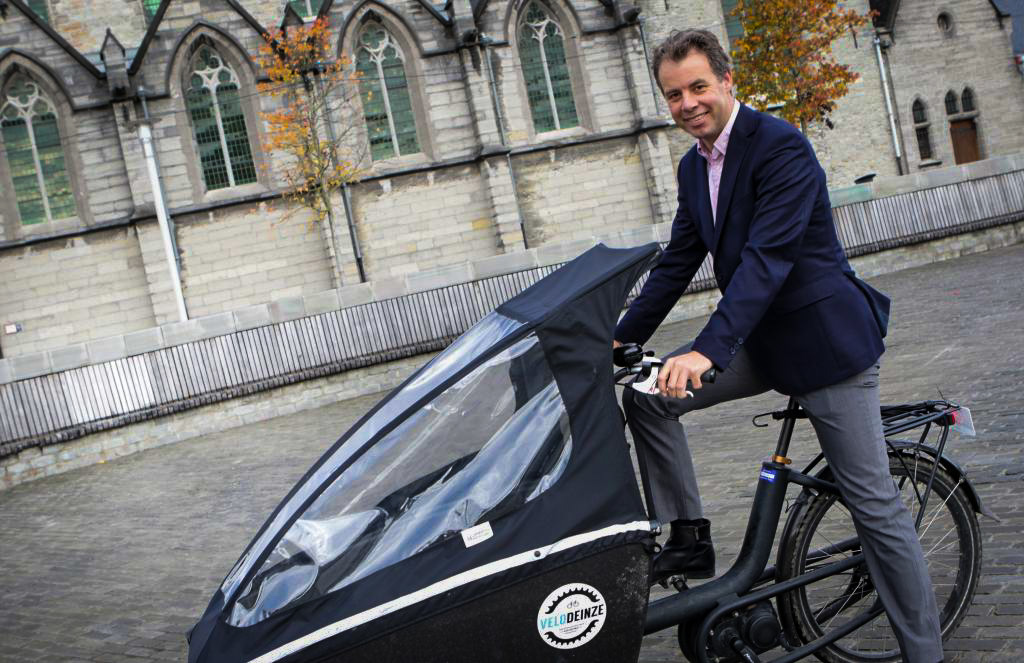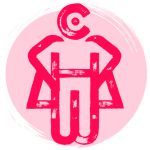This article was written by Aseniya Dimitrova for TheMayor.eu. You can find the original post here.
Jan Vermeulen has been the mayor of Deinze since 2012 and President of the Flemish Cycling Embassy. As mayor, Jan Vermeulen is committed to making his city an even more attractive place for shopping, working, living and strolling.
In this interview, Mr Vermeulen shares how his municipality won the Bicycle city award three times in a row and talks about innovative measures to support the local economy during the coronavirus pandemic.
Mr Vermeulen, you have been involved in local government, as a city councillor of Deinze, since 1995. How has the city changed over this period?
In 1995, before the merger with Nevele, Deinze had a population of 25 000 citizens. Now we have a population of nearly 45 000, 12 000 of which are living in Nevele. That is a massive growth demographically speaking.
In the meantime, the city has undergone a huge urban transformation. Deinze was a very small town with the habits of the countryside. We used to take the car for every errand.
When we needed more accommodations, we simply consumed land and invested in suburbs. Urban sprawl was the key message. The quality of life in the city centre was not considered important.
That changed 10 years ago when a group of young politicians took the wheel. We managed to convince the more experienced politicians to give the car a different, subordinate role in the city centre. It was the start of an ambitious wave of investments into a great public space and public buildings.
In 2012 you took over the mayoral post. What major changes have you introduced and what important projects have you implemented ever since?
We gave the bicycle a very important role in improving mobility in our city. We stopped the urban sprawl and invested in the renewal of the city centre.
We started with a master plan by UAPS and Bas Smets. We began by building three important new public facilities. A city hall/administrative centre, an art academy and a cultural centre – three projects with ambitious architecture. The private sector quickly followed with other ambitious projects of its own.
Atenor, for example, implemented their first major project in Flanders in our city. They bought the old mill factory at the Lys riverside and the developers collaborated with Reiulf Ramstad, a world-famous architect.
The overall key message here is: put your people first. Every new development has to have value for the inhabitants of your city.
As you mentioned above, on 1 January 2019, the municipality of Nevele was merged into Deinze. Has this brought about positive changes?
The merger was financed by the Flemish authorities with a grant of € 20 000 000, raised with the interest in loans which the regional government took over from the city.
That gave us the opportunity to lower our local taxes by up to 50% in the municipality of Nevele. Deinze, together with Nevele, became a more important municipality in the region.
Please tell us about the economic measures that the Municipality has implemented in order to protect local businesses and jobs during the coronavirus pandemic.
We started by protecting our entrepreneurs. We provided them with masks, face shields and alcohol-based hand sanitizers made by local companies.
In our city, we were able to help well before the government could deliver sufficient protective materials. When the stores reopened after the first lockdown, we gave them grants and launched a supportive campaign on social media.
One interesting approach was to appeal to your fellow citizens to buy local and reward them with free rides on the Ferris wheel. Did it work?
It was a great idea. We created a savings card for the ferris wheel. If you visited and bought items at local shops, you also received stamps that could be for a free ride.
Unfortunately, the ferris wheel had to stop prematurely because of federal COVID-19 measures. People with enough stamps for a free ride could trade their savings card for free Dutch doughnuts. But next year, the wheel will be back.
I’m convinced that every year, you have to reward your city with an event or an attraction and give the people something to look forward to.
The corona crisis hit vulnerable families even harder than the rest of society. Deinze started in October an initiative to support these families at their homes. Could you tell us more about this?
Every vulnerable family in our city can visit the Public Centre for Social Welfare to receive a living wage. Due to the crisis, a lot of inhabitants have had to ask for help for the first time in their lives.
The elderly got a phone call from our volunteers and we immediately started ‘Deinze helpt’ – a platform that matches volunteers and people in need of help, such as assistance with shopping, going to the pharmacist, and so on.
Last month the city of Deinze was proclaimed ‘Bicycle City 2020’ in its category – for the third time in a row. What efforts have been made to achieve this success?
One of the main reasons was that the city dared to make important decisions and chose to put the bicycle first. Sometimes going even against the current.
In our plans, we used the STOP-principle. This is a Dutch acronym, which doesn’t translate very well but it stands for the order in which the traffic should be regulated. First you have the Stappers (pedestrians), then Trappers (cyclists), then Openbaar vervoer (public transport) and ultimately Personenwagens (cars).
We designed our infrastructure in such a way so it can be good for an 8-year old child and an 80-year old senior. We made the city accessible for ‘small wheels’ (by which I mean the small wheels of a child’s bike, as well as the small wheels of a walker for elderly people). Small wheels create big cities!
Everybody should be able to cycle safely from their home to every major service point in the city, such as schools, the city hall, the train station and so on. Our aldermen embraced the bicycle by giving a good example themselves. It is not just the mayor you will see on a bike in Deinze.
And of course, we invested a lot in new infrastructure, tunnels, bridges and protected bike lanes. Since then, the number of cyclists has been increasingly growing.
We created a cycling highway between Deinze and Ghent, equipped with a counting device near our train station. Last year, we counted 100 000 cyclists more than there were in Ghent on this cycling route between the two cities. Ghent is approximately ten times the size of Deinze, which says a lot.
Is there another good practice or initiative from your municipality that you would like to recommend to the other mayors in the European Union?
We started a car-free hour during the mornings in the main shopping street. The children feel much safer entering the city with their bicycles and the parents have more peace of mind.
We also created Europe’s biggest OFOS (an advanced stop line for cyclists), as illustrated by the picture below.


